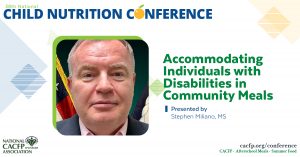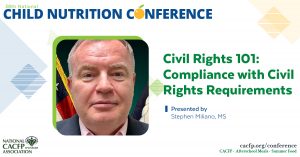2024 Policy
Accommodating Individuals with Disabilities in Community Meals
The session will cover accommodating participants with disabilities in the Child and Adult Care Food Program (CACFP) and the Summer Food Service Program (SFSP) for State agency staff and frontline staff that interact with program participants.
Read MoreCivil Rights 101: Compliance with Civil Rights Requirements
The session will address the Civil Rights training requirements as outlined in FNS Instruction 113-1, Civil Rights Compliance and Enforcement – Nutrition Programs and Activities. State agency staff who interact with program applicants, participants and potentially eligible individuals and those persons who supervise front line staff must receive annual Civil Rights training. This session will fulfill this requirement.
Read More

